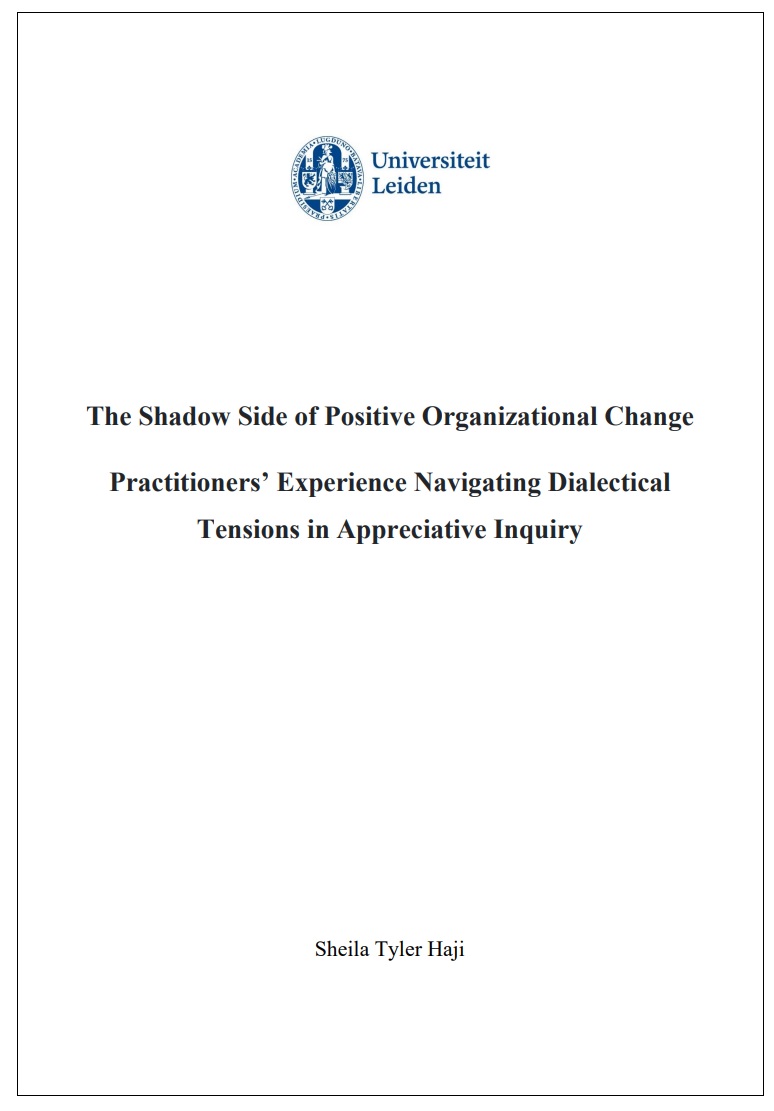
This research of Sheila Tyler Haji investigates tensions associated with positive organizational change (POC) that prioritizes positive possibilities over traditional problem-centric approaches. In 2003, positive organizational scholarship (POS) emerged as a new field of study in organizational sciences (Cameron & Spreitzer, 2011; Cameron & Caza, 2004). POS scholars insist that problems and challenges are not ignored but are reinterpreted through a positive lens (Cameron & Spreitzer, 2011). However, recent literature critiques the prevalence of toxic positivity in society, claiming a bias toward positive thinking denies emotions of sadness, disappointment, anger, and frustration (Collins, 2022; Cross, 2022; Tufvesson, 2020). A key question this research addresses is what do with the ‘elephants in the room’ that represent what people think is undiscussable in a POC context?
In the last decade, AI scholarship began to explore how a focus on the positive has generated the shadow, defined in literature as censored thoughts and emotions by self or others, per organizational norms (Bowles, 1991; Fitzgerald, Oliver, & Hoxsey, 2010; Jung, 1968; Kolodziejski, 2004). In this study, a dialectical frame allows us to see simultaneous and opposing needs (Baxter & Montgomery, 1997; Tracy, 2004) underlying the shadow as a space of tension and possibility.
Participants in the study include 41 organizational development practitioners with direct experience leading POC initiatives using AI methodology. A first round of semi-structured interviews was conducted with 26 practitioners, almost all of whom were independent contractors, who have over 388 combined years of AI practice in a variety of sectors. In the latter stages of research, Hadji chose Interpretive Focus Groups (IFGs) as a data validation methodology (Leavy, 2007) that involved taking raw data from the initial research back to 15 practitioners with similar backgrounds and expertise who would recognize the findings as true and accurate (Lindlof & Taylor, 2002). Transcribed interviews totaled 575 single-spaced pages of data.
A thematic analysis (TA) strategy (Yin, 2016) included multiple steps of compiling, disassembling, reassembling, interpreting the data, and drawing conclusions (Yin, 2016). Hadji used Quirkos, a computer-assisted qualitative data analysis software (CAQDAS), to assist in data storage, retrieval, and coding. Further, she organized the data into brief narrative exemplars (Van Maanen, 2004) representing coded tensions. The findings establish practitioners navigated three primary shadows as dialectical tensions in POC initiatives. The voice shadow illuminates the tension between free expression and limited expression of negative thoughts and concerns. The leadership shadow represents competing needs associated with hierarchical decision-making (e.g., allocation of resources and time) and collaborative decision-making processes valued in AI. The temporal shadow describes the dialectic of short-term orientation (STO), prioritizing needs for immediate change, as opposed to long-term orientation (LTO), privileging sustainable change. The results of this study demonstrate experienced POC practitioners do not ignore the ‘elephants in the room,’ rather, they navigate tensions by using nuanced strategies, such as, creating space to hear divergent perspectives, coaching leaders to demonstrate agility in support of collaborative initiatives, and reframing tension such that one pole does not negate the other.
The study was conducted under the supervision of prof. dr. Jan Adriaanse and dr. Mark Dechesne at Leiden University and dr. Renee G. Heath, co promoter at University of New Hampshire (Durham), USA.
Sheila Tyler Haji
The Shadow Side of Positive Organizational Change Practitioners’ Experience Navigating Dialectical Tensions in Appreciative Inquiry
The dissertation will be available at the repository of the Leiden University: scholarlypublications.universiteitleiden.nl

